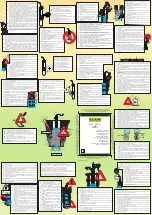
SAViO Water Master Clear Pumps
TM
are designed for use in ponds and water features. They are also useful for
applications such as swimming pools, water storage basins, flooded basements, boats or cellars.
These pumps are not designed for waste water treatment purposes, flammable, corrosive, gaseous, explosive
liquids (i.e. gasoline, fuel, dilutents), greases, oils or food waste - this will void the warranty. The temperature of
the liquid should not exceed 95° F (35° C). For dirty water containing suspended dolid particles use SAViO Water
Master Solid Handling Pumps
TM
.
To prevent personal injury resulting from electrical shock, check the pump for possible damage prior to installation.
Important Safety Instructions
Locate a GFCI (ground fault current interrupter) protected power source nearby. Typically a 4 outlet, 15 amp, 110v,
grounded, single phase service is sufficient. Refer to your electrical equipment specifications or consult a qualified
electrician to determine power demands for your system.
WARNINGS
ALWAYS unplug the power cord to the pump before handling. In case power cable is damaged, replacement
must be performed by the manufacturer or by an authorized service center.
To reduce the risk of electrocution,this device must be protected by a ground fault circuit interrupt switch
(GFCI). If you do not have this switch contact a licensed electrician before installation.
Before connecting the pump to a power source, verify that the power source is the same voltage and
frequency listed on the pump.
Never move or handle device by pulling on the power cord.
Always disconnect the pump from power before any service work.
Do not remove pump housing while the pump is in use.
Product installation should comply with state and local electrical codes.
Connect the pump to a seperate isolated 15 amp circuit breaker or 15 amp fuse block. Using this product in
a low voltage situation can damage the pump motor and other electrical components.
Cutting off the ground pin on the power cord voids the pump warranty and could damage the pump.
Before You Start
2
11
WARNING - ELECTRIC SHOCK HAZARD
This device contains electrical components that can pose significant risk of
electrical shock. To guard against injury, observe basic safety precautions.
Please read the following.
At the end of the season remove the pump from the pond and clean it as outlined above. Under no
circumstances should the pump be left in frozen water.
Winterization
Maintenance
Before performing any pump maintenance unplug the power cord from the electrical socket to ensure that
it cannot restart on its own.
Remove the pump housing from the pump body and clean it periodically or when a decrease in flow is noted.
1) Remove only the screws holding the lower pump housing to pump body.
2) Remove the pump housing from the pump body and carefully clean any debris off the impeller and pump
housing.
3) Replace the pump housing, taking care to replace the o-ring in the o-groove on the pump body. If used to pump
very dirty water (e.g. a flooded basement) the pump must be rinsed with fresh water and cleaned afterward.
Overload protection
The pump is equipped with an thermal overload protector. If the motor overheats, the thermal protector
automatically stops the pump. The cooling time is around 15-20 minutes. During this time search for the cause
(low water level, blockage, impeller jammed) and eliminate it.
3
Pump Installation
1) (Optional) Attach the included 1
1
/
4
” to 1
1
/
2
” MIPT adapter to the pump outlet using teflon tape.
2) Install the pump in an upright position (handle upward).
3) Connect the pump discharge to PVC pipe (not included).
4) Place the discharge end of the PVC above water level to prevent accidental siphon draining of the pond when
the pump is off.
5) Locate the power source away from water. Plug the pump into a ground fault circuit interrupt (GFCI) to prevent
electric shock. Do not attempt to install or remove the pump with the power cord plugged in.
6) Keep the pump underwater when operating. Failure to operate the pump in water causes overheating and will
shorten its service life.
7) Place the pump so the intake is kept free from blockage by mud or fibrous materials. Set the pump on a block
elevated off the pond bottom. This prevents the pump from pulling in debris that has settled on pond bottom. Do
not place on gravel.
8) To facilitate pump priming, force trapped air out of the pump housing by submerging it with the discharge outlet
facing upward.
9) To start the pump, simply plug it in.





















